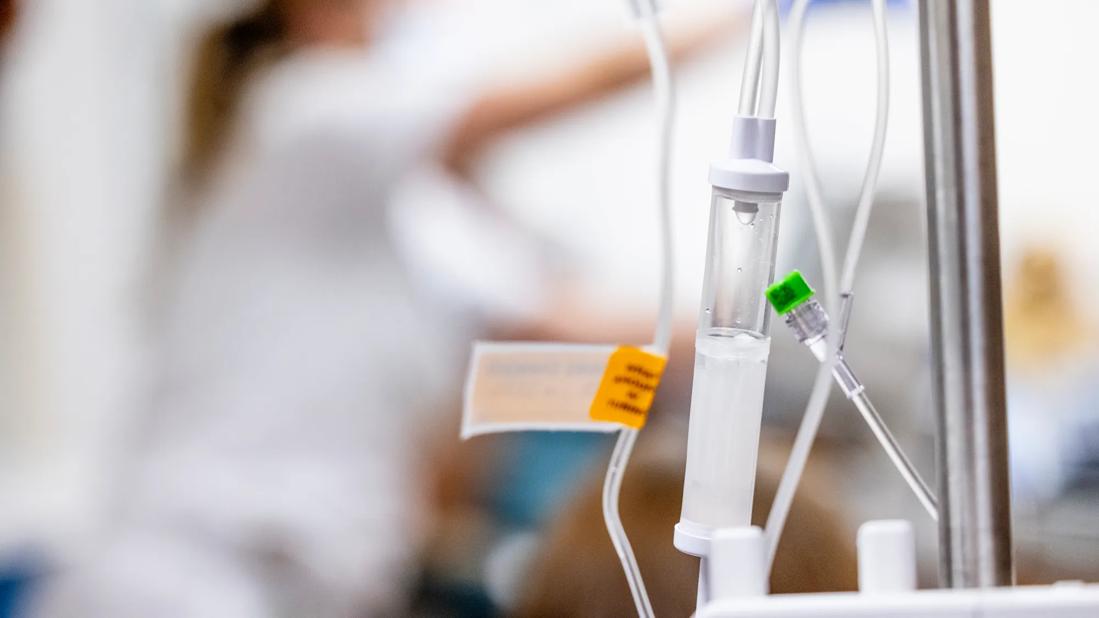Large trial shows efficacy and lower incidences of heart issues and bleeding events with novel non-covalent BTK inhibitor

A major, multi-site Phase 1/2 trial demonstrated that 73.3% of patients with relapsed chronic lymphocyte leukemia (CLL) achieved an overall response to treatment with the non-covalent BTK inhibitor pirtobrutinib, despite having disease progression on a previous BTK inhibitor. These results, which were recently published in the New England Journal of Medicine, are notable due to the dearth of options available to this patient population.
Advertisement
Cleveland Clinic is a non-profit academic medical center. Advertising on our site helps support our mission. We do not endorse non-Cleveland Clinic products or services. Policy
Primarily affecting older patients, CLL is treatable with BTK inhibitors such as ibrutinib, zanubrutinib and acalabrutinib as well as BCL-2 inhibitors. However, once a patient relapsed after receiving these treatments, there were fewer treatment options, and the median survival rate was low. There has been limited data on the efficacy of trying a different BTK inhibitor in these cases.
Pirtobrutinib is a highly selective, non-covalent (reversible) BTK inhibitor with clinical activity even in patients with C481 mutations. Researchers postulated that using a reversible binding agent such as pirtobrutinib could improve outcomes for patients with CLL who were previously treated with a BTK inhibitor, particularly in cases with C481 mutation.
The study evaluated the use of single-agent pirtobrutinib in patients with relapsed/refractory B-cell lymphoid malignancies, including CLL. The purpose was to determine the efficacy of treatment, and to evaluate its safety profile. The primary endpoint was an overall response, with a secondary end point including progression-free survival and safety. Of the 247 patients in the trial with CLL, 70% of those had experienced disease progression on a prior BTK inhibitor. The study included patients who had controlled atrial fibrillation (aFib) as well as those on an anticoagulation agent, excluding Coumadin.
The overall response rate was 73.3%, which increased to 82% if partial response with lymphocytosis was taken into account. Most were partial responses (71%), with only 4 patients (2%) achieving a complete response. At a median follow up of 19.4 months, the median progression-free survival (PFS) was 19.6 months. Similar median PFS was observed among different subgroups, including patients with a BTK C481 mutation.
Advertisement
Encouraging responses were noted in high-risk CLL with a del 17p/TP53 mutation, complex karyotype, advance stage disease and older patients. The 18-month overall survival (OS) was 81%, but the median overall (OS) could not be estimated.
“The response rate in patients who were exposed to BTK and progressed in the past was promising,” says Deepa Jagadeesh, MD, study co-author and a hematologist/oncologist at Cleveland Clinic’s Taussig Cancer Center. “Some of these patients had penta failure disease, which means they had already been exposed to an anti-CD20 monoclonal antibody, chemotherapy, BTK inhibitor, BCL-2 as well as PI3 kinase inhibitors (PI3Ki). It is very encouraging to see that heavily pretreated patients could still achieve a response.”
The study results indicate that pirtubrutinib is a highly selective agent. Notably, the toxicity profile appears to be an improvement over first- and second-generation BTK inhibitors. “We saw few incidents of cardiac toxicities like atrial fibrillation, hypertension and bleeding complications compared to previous BTK agents, despite the inclusion of patients with aFib on anticoagulation,” says Dr. Jagadeesh.
This is a significant finding, since earlier BTK inhibitors are known to increase the risk of bleeding and cardiac events. Having an improved safety profile is especially beneficial for patients with CLL, who tend to be older and have comorbidities such as hypertension and aFib. “The safety profile is better, and the response among heavily pretreated patients is promising. The most common adverse event was neutropenia, which was experienced by 33% of patients. Other common side effects included fatigue and diarrhea.”
Advertisement
Pirtubrutinib was recently approved for the treatment of relapsed mantle cell lymphoma after 2 prior lines of therapy but is not yet approved for treating CLL. Trials are ongoing evaluating pirtobrutinib combination therapies in relapsed CLL and other B-cell malignancies, in newly diagnosed CLL patients, as well as where it will fit as an earlier line of therapy. “Currently, I would probably use it in patients who had relapsed after a BTK and BCL2 inhibitors or for a patient who has a toxicity that would prevent them from receiving an earlier-generation BTK inhibitor, says Dr. Jagadeesh.”
Advertisement
Advertisement

Discussing research into improving CAR T-cell therapy efficacy

Blinatumomab plus chemotherapy improves overall survival and relapse-free survival over chemotherapy alone

Single-cell next-gen sequencing showing promise to improve sensitivity of MRD testing

Regular surveillance necessary to identify safety signals

Study shows significantly reduced risk of mortality and disease complications in patients receiving GLP-1 agonists

Offers a new option for patients 60 and older with relapsed/refractory disease

Investigational chimeric antigen receptor natural killer cell therapy NKX101 associated with promising early response in patients with relapsed/refractory acute myeloid leukemia

Immunological pressure driving genetic mutations